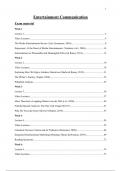1
Entertainment Communication
Exam material
Week 1
Lecture 1.....................................................................................................................................3
Video Lectures............................................................................................................................4
The Media Entertainment Succes Cycle (Lemmens, 2024)....................................................... 8
Enjoyment: At the Heart of Media Entertainment (Vorderer et al., 2004).............................. 14
Entertainment as Pleasurable and Meaningful (Oliver & Raney, 2011).................................. 15
Week 2
Lecture 2...................................................................................................................................16
Video Lectures..........................................................................................................................18
Exploring How We Enjoy Antihero Narratives (Shafer & Raney, 2012)................................ 31
The Writer’s Journey (Vogler, 2024)........................................................................................32
Whiplash Analysis....................................................................................................................35
Week 3
Lecture 3...................................................................................................................................36
Video Lectures..........................................................................................................................37
More Than Just a Laughing Matter (van der Wal et al., 2020)................................................ 49
Friends Episode Analysis: The One with Unagi (S6 E17).......................................................51
Why Do You Like Scary Movies? (Martin, 2019)................................................................... 53
Week 4
Lecture 4...................................................................................................................................54
Video Lectures..........................................................................................................................55
Cinematic Success Criteria and its Predictors (Simonton, 2009).............................................64
Integrated Entertainment Marketing (Henning-Thurau & Houston, 2019)............................. 69
Reading Questions....................................................................................................................72
Week 6
Lecture 6...................................................................................................................................74
Video Lectures..........................................................................................................................75
, 2
A Motivational Model of Video Game Engagement (Przybylski et al. 2010)......................... 87
Play or Pay to Win (Lemmens, 2022)...................................................................................... 88
Reading Questions....................................................................................................................90
Week 7
Video Lectures..........................................................................................................................93
Lecture 7.................................................................................................................................100
Fear and loathing in VR (Lemmens et al., 2022)................................................................... 107
The paradox of interactive media (Bowman et al., 2020)...................................................... 108
Reading Questions..................................................................................................................108
Practice Question
Answers.................................................................................................................................. 125
, 3
Week 1
Lecture 1
➔ Public Service Media: entertainment is partially government-supported, but not
owned. Most funding comes from taxes.
◆ Focuses on accuracy and ethics.
◆ Primary goals: cultural enrichment, informed and engaged citizenship.
➔ Defining entertainment: the action of providing or being provided with amusement
or enjoyment. A form of activity that holds the attention and interest of an audience.
◆ Complex, dynamic, and multi-faceted experience one goes through while
being exposed to this type of media.
◆ Any market offering whose main purpose is to pleasure consumers, versus
offering primarily functional utility.
◆ Any mediated product created to engage an audience.
◆ It has been understood as not a product (movie, game, or TV show) or as a
feature of such product (action, comedy…) but rather as a response to it.
➔ Differential susceptibility to media effects model: DSMM (Valkenburg & Peter,
2013)
◆ Three factors predict media use: disposition, developmental level, and social
environment.
◆ These three factors also moderate individual responses to media use.
◆ Media effects are transactional, meaning that the effects of media use also
influence media use.
➔ The insatiable need for entertainment experiences: because the attributes of the
experience dominate consumers’ quality judgments for entertainment products, they
are referred to as “experience goods”.
, 4
◆ The enormous amount of entertainment products that are being released every
week is driven by the short cycle of experience goods and consumers’
insatiable need for continuous selection of new products.
Video Lectures
➔ Credence goods: goods whose quality consumers do not judge by their consumption
experience alone, but rather by accepting, as a matter of faith or credence, a particular
expertise of certain certified authorities.
➔ Preference can be strongly influenced by:
◆ Demographic: gender, age, income, education, location, ethnicity….
◆ Social: culture, family, friends, peers, and society.
◆ Trait and state: psychosocial traits, cognitive capabilities, attitudes, values,
beliefs, state, and mood.
◆ Media entertainment: experience and knowledge.
➔ Popular culture: pop culture, for short, is the set of practices, beliefs, and values
around entertainment that is dominant in a society at any point in time. Popular
Culture reflects our current entertainment culture. It is the constantly evolving domain
of entertainment that is created in mass quantities for an enormous audience.
◆ Its products are recognizable on a global scale and they are extremely
influential (economically and culturally).
◆ Cultural differences: a nation transmits the values of what is - and what is
not to be appreciated to its members. As part of a continuous and often
lifelong socialization process.
➔ Theories that affect the selection of the entertainment process:
◆ Zeitgeist: the temporal aspect of cultural influence, the defining mood of a
particular period in history, as shown by the ideas and beliefs of that time.
Cultural trends can indicate that the time is right for a product.
● The economic outlook of a period has a positive influence on the use
of entertainment in general. Entertainment products are more attractive
than bleaker economic times, even though consumers have less money
at their disposal.
◆ Escapism: the tendency to seek distraction and relief from unpleasant realities
through entertainment, especially fictional entertainment provides a form of





